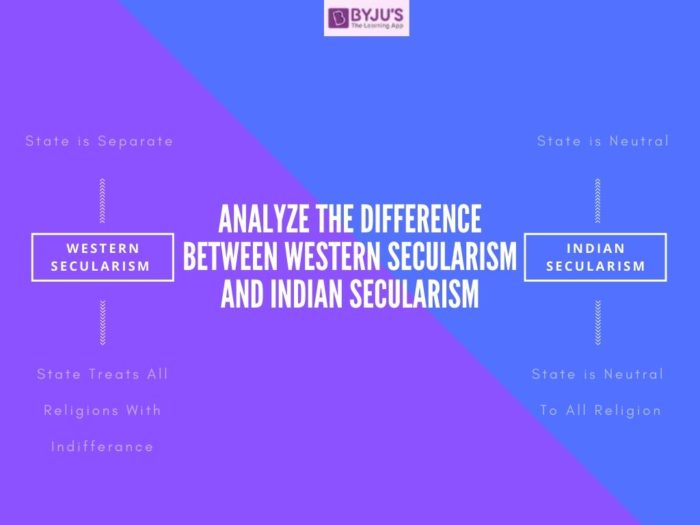Secularism is defined as the separation of state from the influence and functioning of all religious institutions.
Although the general meaning is nominally the same in all democratic setups, its application varies from region to region. This article will elaborate upon how secularism in the West is different from that of secularism in India.
Secularism is enshrined in the Constitution of India through the 42nd Amendment. Thus the concept of secularism is important in the UPSC Exams.

The difference between Western-Secularism and India-Secularism is elaborated upon below
Differences Between Western-Secularism and Indian-Secularism
| Western-Secularism |
Indian-Secularism |
| In the West, the State is separate from the functioning of all religious institutions and groups. | Secularism in India means that the state is neutral to all religious groups but not necessarily separate. |
| The state believes in total non-interference of religion. The state is allowed to curtail the rights of citizens if religion is causing hindrance in the functioning of the state. | In India, the concept is not restricted to the question of how religious groups should be treated. Instead, the essence of secularism lies in forging a positive relationship between the state and religion. |
| The Western concept of Secularism does not believe in an open display of religion except for places of worship. | In India, all expression of Religion is manifested equally with support from the state. |
| The distinction between state and religion is clear and set in stone. | There is no clear distinction between the state and religion in India. |
| The concept of secularism first came about in the mid-17th Century concepts of Enlightenment which were enshrined first in the Constitution of France following the French Revolution (5 May 1789 – 9 November 1799). | Although the concept of secularism was rudimentary practised in ancient and medieval India, the term secularism was enshrined in the Constitution of India with the 42nd Amendment Act, 1976. |
| The state treats all religions with equal indifference. It does not aid any religious institutions through financial means or tax them. | The state gives financial aid to religious institutions and taxes them as well. |
| A single uniform code of law is used to dispense justice regardless of religious background. | Although the law is the same for all citizens, certain personal laws with regard to marriage and property rights are different for every community. But they are all given equal consideration under the Indian Penal Code. |
You can find similar topics and other topics related to the polity segment refer to the links given below:
- Right to Freedom of Religion
- Uniform Civil Code
- Fundamental Rights
- Difference Between Constitution and Law
- Difference Between Written Constitution and Unwritten Constitution
- UPSC Indian Polity Notes
- Polity Syllabus and Strategy for UPSC
Aspirants can find more Difference Between Articles, by visiting the linked page
Western Secularism and Indian Secularism – Download PDF Here
FAQ about Western Secularism and Indian Secularism
Is India a secular country?
What is a non-secular state? Give examples.
You can get a general idea of the exam by visiting the UPSC Syllabus page. For more preparation materials, you can refer to the links given below:
Related Links
| NCERT Books | UPSC Exam Pattern | Current Affairs Quiz |
| Albedo of Earth | Lord Minto | GPSC |
| Current Affairs 2023 PDF | Black Soil in India | Mauryan Empire |
Comments